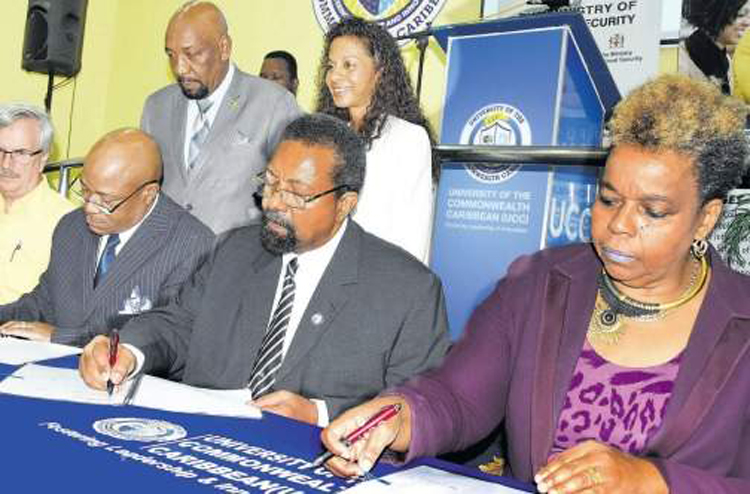(Jamaica Observer) Four prisoners have been given the chance to gain a university education through a multi-agency partnership that will see them accessing scholarships to pursue associate of science degrees in business administration at the University of the Commonwealth Caribbean (UCC).
The courses will be done online.
The announcement was made yesterday at the launch of the UCC Scholarship for Incarcerated Persons, which was marked by the signing of a Memorandum of Understanding (MOU) between UCC, the Ministry of National Security (MNS), the Department of Correctional Services (DCS), and Stand Up For Jamaica — a non-governmental human rights organisation domiciled in Jamaica whose mission includes the provision of education to incarcerated offenders with the goal of enhanced rehabilitation.
According to Professor Bernadette Warner, executive vice-president for academic services at UCC, under the MOU, the four inmates will receive scholarships valued at $300,000 each, to pursue the degree programme online at the St Catherine Adult Correctional Centre as a pilot project this spring semester 2020. Additionally, the inmates will be accompanied by an approved correctional officer, who has also received a scholarship to pursue the same course.
Inquiries about the selected inmates by the Jamaica Observer did not uncover their offences or the length of their jail sentences. However, Santana Salmon, public relations officer for the DCS, explained the selection process and conditions for the academic award.
“The four inmates were chosen based on the requirements of the programme and how well-suited they were, based on performance, qualifications — CSEC (Caribbean Secondary Education Certificate) subjects — and the amount of time they have left inside the institution,” she said.
Salmon added: “Inmate one has 10 CSEC subjects, inmate two has eight CSEC subjects, inmate three has eight CSEC subjects, and inmate four has seven CSEC subjects. [Inmate four] also received [an] automatic certificate because of his excellence in the business subjects. The fifth candidate is an officer selected through an interview process, to be a part of the programme. All the CSEC subjects required to participate in the programme were acquired by the inmates since their incarceration.”
The duration of the degree programme is two years and orientation begins on January 8. The inmates will begin classes on January 11.
Professor Warner said the development of the MOU followed the inquiry of an adjunct lecturer at UCC’s May Pen campus, regarding the pursuit of degree programmes for qualified correctional centre inmates. The concern led to a meeting with representatives from UCC and Stand Up For Jamaica.
“This eventually created MOU owes a great deal to the creative vision of all three parties who share a commitment to make a difference to the problem of recidivism among offenders who have served their sentences, and to Jamaica’s socio-economic development, by means of expanding the reach of higher education into our nation’s correctional facilities,” she said.
Professor Warner also pointed out that students will receive the necessary resources to support the learning process.
“The Department of Correctional Services will provide the students with an appropriately equipped lab, books, material, and student support services, in collaboration with Stand Up For Jamaica, and will meet the cost of non-tuition fees, apart from each student’s application and miscellaneous fees, which will also be addressed by the University of the Commonwealth Caribbean,” she said.
Minister of State in the Ministry of National Security Rudyard Spencer said the MOU represented a life-changing opportunity for the inmates that will eventually be beneficial to society.
“Today’s signing shows that we understand the limitations and hear the cries of the offenders who face difficulties qualifying for employment opportunities because of educational limitations. Therefore, we are increasing the marketability of inmates and officers by providing sustainable scholarships and grants through worthwhile partnerships,” Spencer said.
He added that gone are the days when draconian approaches to disciplining offenders are accepted.
“Simply locking up people and throwing away the keys is no longer a part of the correctional process. We have shifted gear, our focus is not on punishment but on redemption,” he said.
The ministry’s Permanent Secretary Dianne McIntosh welcomed the partnership and contended that education represents a vital role in the rehabilitative process, to prevent and/or reduce the incidence of reoffending.
“It has been proven that robust education programmes, including the integration of higher education, reduces the risk of recidivism following the release of inmates into society,” she said, adding that more than 800 inmates across the island’s penal system are enrolled in academic and vocational programmes.
McIntosh added: “Our reports show that these programmes work, as approximately 54 per cent of our inmates enrolled fall within the remedial group, and it is my hope that with the introduction of online programmes, inmates may have the opportunity to increase access to a more diverse and extensive curriculum.”
In addition, director for Stand Up For Jamaica André Schwab said the initiative will provide inmates with the tools they need to contribute meaningfully to society when they are released.
“Our inmates need to be helped so when they leave prison they don’t come back,” he said.

